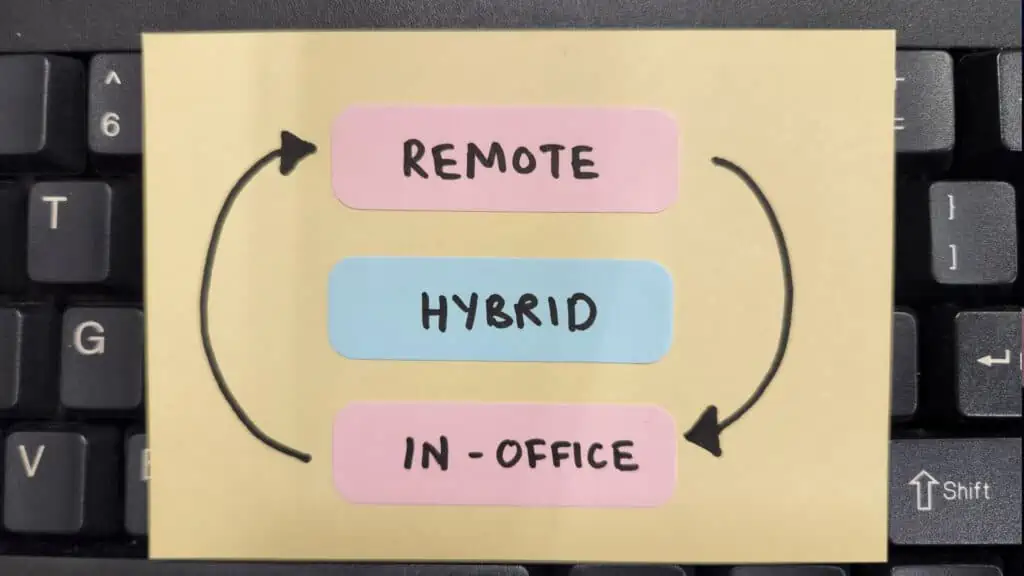Together with Reworked INSIGHTS, Zoom has presented the results of a survey entitled “Navigating the Future of Work: Global Perspectives on Hybrid Models and Technologies”. According to the survey, hybrid working is becoming the preferred working style worldwide.
83% of employees surveyed in Germany, France and the UK stated that they feel more productive when working hybrid or remotely than in the office on site. In fact, the value of hybrid working goes far beyond the obvious benefits of flexibility: according to the study, hybrid employees feel more connected to their teams and managers (82%).
Hybrid working offers significant added value
As companies adapt their ways of working to meet the needs of their customers and employees, hybrid working from home or on the move is becoming increasingly popular. 64% of managers stated that they currently offer their teams the option to work from home.
When people talk about flexible working, it’s always about productivity. A clear majority of managers surveyed (84%) stated that the increase in productivity associated with flexible working models is their top priority. In fact, the study found that employees are more productive when they work hybrid. 84% of employees stated that they can get more done in a hybrid working environment than if they only work in the office. However, this requires companies to invest in the right technologies to enable their employees to stay in touch.
It may come as a surprise to managers that while 72% of face-to-face respondents felt very close or closely connected to their manager, this was the case for even more respondents in the hybrid group (82%). This shows that the feeling of connectedness does not necessarily depend on personal interaction and that relationships can be built and maintained in different working environments.
Workplaces continue to develop
Even though companies have settled into various hybrid models, 75% of executives believe it is very likely or likely that their company will change its working style in the next two years. The survey also revealed the following:
- 82% of managers are planning to make their working environment more flexible in the next two years.
- Managers overwhelmingly say that their working methods have become more flexible for employees in the last two years (50% say they have become much more flexible and 45% say they have become somewhat more flexible).
Building a successful, future-proof workplace requires continuous adaptation to employee feedback and evolving preferences. Having the right technology that can simultaneously adapt and evolve with the business is also an important piece of the puzzle.
Generative AI is a key factor for future success in the workplace
In order to prepare for the constant changes in the world of work, companies must regularly adapt and improve their hardware and software. The survey showed that employees have identified significant shortcomings in their companies’ digital working environments.
- Most employees (75%) believe that their company’s current tools and technologies need to be improved for hybrid working.
- 72% of employees believe that their company needs new tools or technologies to support remote working.
What is the place of generative AI? Ultimately, generative AI is expected to have a major impact on the future of work. The opinions of managers and employees differ slightly, but both groups recognize the value of this technology.
- 94% of managers use AI in their company and 84% say that the integration of AI has had a positive impact on productivity.
- 64% of employees strongly or slightly agree that “generative AI makes my work easier”.
Region-specific results
While the survey highlighted the global trend towards flexibility in the workplace, social and cultural norms also influenced the results.
Germany, France and Great Britain
- 75% of the managers surveyed have introduced a hybrid working model.
- 77% of knowledge workers say they get more work done in a hybrid/remote environment than in the office/onsite.
- While knowledge workers in Western Europe prefer flexibility, they are also the least interested in fully remote working globally – 43% (compared to NA – 56%, APAC – 49%).
APAC
- 58% of companies have introduced a hybrid working model.
- 83% of employees say they get more work done in a hybrid/remote environment than in the office/on-site
- 81% of employees believe that the tools and technologies their company currently uses for remote working need to be improved, and 78% believe that their company needs new tools or technologies to support hybrid working.
As hybrid working becomes the dominant model, leaders must adapt to changing employee preferences and invest in better workplace technologies and AI solutions.
With the right strategic foresight, leaders can navigate the complexities of an evolving work environment, build a future-ready workforce and thrive in this new world of work.
Methodology
The Future of Work Survey and the IT Executive Survey were global studies conducted by Reworked INSIGHTS on behalf of Zoom. The companies surveyed more than 600 IT and C-suite executives and nearly 1,900 knowledge workers around the world about their views on different workplace models, productivity levels in different models, the impact of generative AI on work, and other topics related to the future of work. The data was collected online, all questions were mandatory, and the results were collected anonymously. Employer survey data: April-May 2024; respondents: 624. Employee survey data: April-May 2024; respondents: 1,870.
(pd/Zoom)






